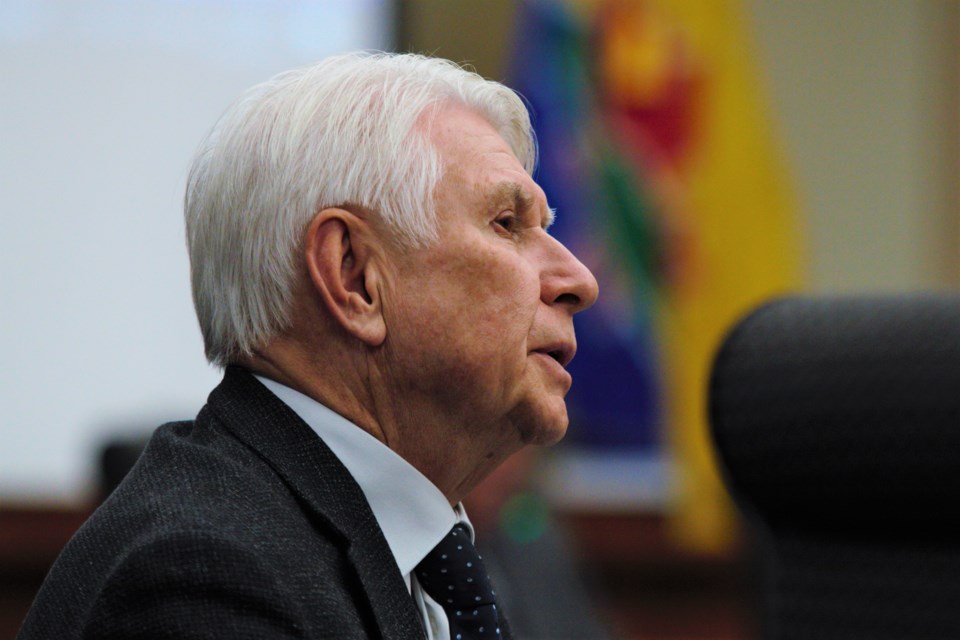THUNDER BAY – Members of Thunder Bay’s embattled police services board would see their pay more than triple, under a proposed budget that seeks a nearly 70 per cent increase in city funding overall.
The move would make sitting on the board one of the best-paying assignments for city councillors, with Mayor Ken Boshcoff and Coun. Shelby Ch’ng each set to receive an increase of $7,000 a year.
The raises, which align with recommendations from an expert panel appointed to advise the board, would also apply to the city’s citizen appointee, and two provincial appointees.
Two of those three positions remain vacant, while the province recently appointed Karen Machado to fill one of its seats.
None of the board members currently hold any decision-making power, after the Ontario Civilian Police Commission (OCPC) appointed administrator Malcolm Mercer to oversee the board, finding its level of internal dysfunction constituted an “emergency.”
It means Mercer cast the lone vote approving the board’s proposed budget, which city council is now considering in the lead-up to a final vote on the city budget on Feb. 6.
The board is asking the city to expand its funding by 68 per cent from 2022, to a total of $763,200.
It's a steep increase, but makes up just a small part of the city's police spending, which now stands at nearly $60 million a year.
That's risen nearly 50 per cent since 2018, and now accounts for around a quarter of the city's budget.
Council has signalled it will approve an increase of nearly $4 million in policing costs this year, even as it contemplates cuts to other city services.
The police services board’s actual costs last year were just shy of $900,000, nearly double the budget council approved.
The increases prompted some questions from councillors during a budget meeting last week, though none signalled a desire for reductions.
“I can’t look at this budget and [not] ask… the minimum amount [any of your line items] have increased from 2022 is 50 per cent,” said Coun. Kasey Etreni. “Can you just give us a very brief understanding why we’re seeing such big percentages on this budget for the board?”
Board secretary John Hannam said legal fees were one big reason, with the board spending three times what it budgeted for legal fees last year.
“The bulk of the increase and the overruns that we experienced in 2022 largely lie in the cost of legal services,” he said. “As members may be aware, we had, um, considerable activity requiring legal counsel and support.”
Hannam was presumably alluding in part to a torrent of human rights complaints filed against the police service, the police services board, and members of its leadership including Hannam himself.
The complaints were filed by current and former officers, former police board chair Georjann Morriseau, and others.
Another factor in rising costs, said Hannam, is work responding to recommendations from multiple outside reviews that found systemic racism in the police force and prompted the reinvestigation of the deaths of over a dozen Indigenous people.
While the board has touted its progress on that front, Mercer found “a very concerning failure to advance the recommendations” in the 2018 Sinclair report, which dissolved the police services board, concluding it had shown "willful blindness" in failing to address anti-Indigenous racism.
In a recent interview, Mercer acknowledged the board’s record might leave some feeling its members don’t deserve a raise. However, he believes it’s the right way forward to achieve organizational change.
"You can say, if people aren’t doing a good job, why would you pay them more?" he said.
"I think the way to look at it [is]... if you don’t pay people properly to do a job – and I don’t think this comes close to paying them properly – you shouldn’t be surprised if the job doesn’t get done."
Perhaps even more important, Mercer said, is that the budget also boosts funding to retain expert services to advise the board.
He said the recently added volunteer governance committee will also be an important resource.
"I see all of these things working together to, I hope, make a more effective board," he said.
On Wednesday, he told council the added expenses could be necessary to avoid a repeat of policing debacles that have generated national headlines.
“I was the second administrator appointed in the last several years, [and] in order for an administrator to be appointed, the Ontario Civilian Police Commission needs to conclude there’s an emergency,” he said. “I spent a lot of time looking back at that history and trying to think hard about how not to be the second of three administrators.”
“The reality is that if you’re going to have civilian oversight of a police service… particularly in a community that has high crime, high social difficulties, and a history that needs to be dealt with in terms of Indigeneity, there’s a big job for this board to do.”
Mercer also noted increasing board pay is in line with recommendations issued by an expert panel appointed to advise the board.
The panel suggested higher compensation for board members would help strengthen civilian governance.
The panel has also called for the board chair to become a full-time position “paid equal to a city councillor,” or around $34,000 (though councillors actually pull in more like $40,000 to $50,000 with other benefits).
The panel also recommended significantly expanding First Nations representation on the board, a recommendation that has not yet been addressed.
